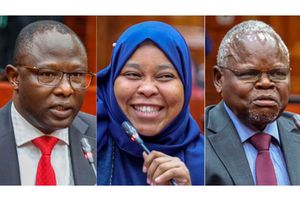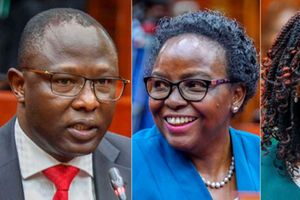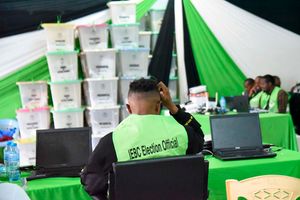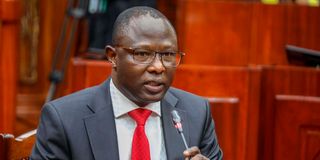
The Independent Electoral and Boundaries Commission (IEBC) chairperson nominee Erastus Edung Ethekon before the justice and Legal Affairs Committee.
The High Court has quashed President William Ruto’s appointment of Erastus Ethekon as Independent Electoral and Boundaries Commission (IEBC) chairperson and six others as commissioners for breaching an interim order halting their gazettement and formal appointment.
The court, however, upheld the President’s nomination of the seven persons and dismissed a petition to nullify their selection over alleged violation of the Constitution. The seven are Mr Ethekon, Ann Nderitu, Moses Alutalala Mukhwana, Mary Karen Sorobit, Hassan Noor Hassan, Francis Odhiambo Aduol and Fahima Araphat Abdallah.
In a judgement delivered on Thursday, a three-judge bench comprising Justices Roseline Aburili, John Chigiti and Bahati Mwamuye said the President appointed the seven in contravention of an order issued on May 29, 2029 barring their appointment and gazettment pending determination of a petition filed by two Kenyans.
The Independent Electoral and Boundaries Commission's timeline.
The bench said court orders are not merely suggestions and any action taken in contravention of a court order is null and has no legal effect.
President Ruto gazetted the seven names on June 10 through two gazette notices, a move that escalated the legal challenge initiated by Mr Kevin Roy Omondi and Boniface Mwangi. According to the judges, the President should have complied with the court order by waiting for conclusion of court proceedings.
“A nominee cannot take the oath of office based on an illegal appointment. A court cannot sanction an illegality. To uphold rule of law and legitimacy of the IEBC to the people of Kenya, an illegality cannot be the foundation of legitimacy. The two gazette notices were issued in direct contravention of valid court orders. Their appointment was unlawful null and void,” said the judges.
However, the court dismissed the petition and upheld the President’s nomination of the commissioners after finding that there was no evidence of irregularity or proof of constitutional breach or bias.
The court said there was no evidence that the nominees were ineligible or there was no regional balance.
According to the court, the former provinces were not constitutionally recognised and the court could not analyse the background of the nominees based on the provinces. Hence, the court found that there was no evidence to show that more than one nominee was from the same community or region.
The target for this argument was Mr Ethekon and Ms Sorobit, whom the petitioners claimed were from the former Rift Valley Province. But the court noted that Mr Ethekon was from Turkana County while Ms Sorobit from Uasin Gishu County.
Furthermore, the court found that there was a disconnect between the alleged violations of the Constitution and the reliefs sought by the petitioners.
“Constitutional Petitions must be well particularized and must be specific in the manner in which the allegations occurred and the violators. This petition failed to meet the reasonable precision test. For failure to articulate how the Constitution bill of rights was violated or threatened, this court finds it fell short of the threshold to invoke court’s jurisdiction in Article 22 and 23 of the Constitution,” said the bench.
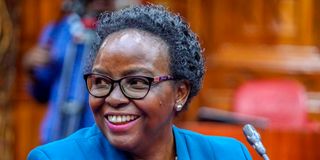
Independent Electoral and Boundaries Commission (IEBC) nominee Mary Karen Sorobit when she appeared before the Justice and Legal Affairs Committee.
The incoming commissioners will have to hit the ground running after being sworn in with a full in-tray awaiting them, including preparation for the 2027 elections. The team, which comes into office after a long period of vacancy, faces the daunting task of addressing a backlog of electoral processes such as long overdue mini-polls, delayed boundaries delimitation, and recruitment of senior staff.
Others are procurement of strategic election materials, registration of new voters, continuous voter education as well as overseeing the implementation of relevant election laws.
The development comes after the court on Thursday paved the way for the swearing-in of the new team after throwing out a petition challenging their appointment. President William Ruto had gazetted the new team on June 10, 2025.
Swearing-in of the new commissioners
This is despite the High Court in May issuing an order stopping the gazettement and swearing-in of the new commissioners until the petition was heard and determined.
The absence of a new team left the IEBC crippled, as key decisions could not be made without the chairperson and commissioners. Of immediate concern are the 22 pending by-elections including six for constituencies, a senatorial seat and 15 member of county assembly seats.
The minipolls include that for the Baringo senatorial seat, which fell vacant following the death of William Cheptumo in February. Similarly, the Banisa parliamentary seat fell vacant following the death of Hassan Kullow in a road accident in March, while the Supreme Court upheld the nullification of the election of Magarini MP Harrison Kombe on May 31, 2024, causing a vacancy.
The death of MP Malulu Injendi in February this year also created a vacancy in Malava Constituency while the elevation of Ugunja MP Opiyo Wandayi to Energy and Petroleum cabinet secretary left the constituency without an MP.
The IEBC has been allocated Sh788 million by the National Treasury in the current financial year ending June 30, 2026 for some 16 by-elections.
The other six – comprising two constituencies (Mbeere North and Kasipul) – which occurred after the electoral agency had submitted its budget estimates for the current fiscal year, will have to wait until the Sh215.84 million required budget is factored in by the Treasury.
The Kasipul Constituency seat fell vacant following the assassination of area MP Ong’ondo Were in Nairobi in May, while the Mbeere North seat became vacant following the appointment of Geoffrey Ruku to the Cabinet as Public Service CS, replacing Mr Justin Muturi who was sacked.
The IEBC has not been able to conduct by-elections since the lapse of the term of the previous commissioners in January 2023. It has received various writs from the respective speakers notifying it of vacancies and inviting it to conduct the by-elections.
However, an advisory from the Attorney-General affirmed that the secretariat cannot conduct delimitations of boundaries and by-elections without commissioners being in office.
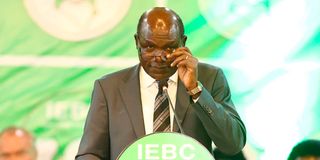
Former Independent Electoral and Boundaries Commission (IEBC) Chairman Wafula Chebukati speaks to the media at the Bomas of Kenya on August 10, 2022.
The six-year non-renewable term of immediate former chairman Wafula Chebukati, who died in February, and two commissioners – Boya Molu and Abdi Guliye – ended in January 2023 while the other four commissioners either resigned or were bundled out of office following the hotly-contested 2022 presidential election.
Closely tied to overseeing the mini-polls is the preparations for the 2027 General Election, which involves voter registration, voter education, and ensuring a smooth electoral process for a free, fair, and credible elections.
Mr Johan Kriegler, a South African retired judge who chaired the Independent Review Commission on Kenya’s electoral reforms, recommended that IEBC commissioners must be in office at least two years before a General Election.
Continuous voter registration
This, according to Mr Kriegler, is critical to allow the commissioners to be trained in good time to start preparations that include recruiting suitable staff and procuring election materials.
Accordingly, the commission will have little time to catch its breath once in office with less than a month to hit the recommended two-years rubicon – a point of no return. The agency is required to conduct continuous voter registration and elections whenever a vacancy occurs.
However, the IEBC has not been able to conduct continuous voter registration due to lack of commissioners, insufficient funding and absence of registration officers. There is also a need for the commission to train technical staff on the new registration technology, review and map the registration centres and consider onboarding services on the e-Citizen platform.
In terms of procurement of strategic election materials, the Commission needs to replace its ageing electoral technology with Biometric Voter Registration (BVR) kits acquired in 2010 and Kenya Integrated Election Management System (Kiems) kits in 2017.
Technology is now a critical component of elections in Kenya following the Elections (Amendment) Act, 2016.
The law change saw the introduction of Kiems kits in the 2017 elections, with the kits now a permanent fixture in elections.
Appearing before a Senate committee last month, IEBC CEO Marjan Hussein Marjan said the ageing BVR kits, now over 15 years old, are no longer supported by the manufacturer, while the Kiems kits, manufactured by Idemia in 2017, are nearing the end of their expected industry support life-cycle.
He pointed out that the Commission acquired 14,100 new Kiems kits in 2022 as well as new BVR software systems for the future. However, the staff have not been trained on the new voter registration system because the IEBC has not been paying for their maintenance due to lack of funding. There has also been no money to conduct the required training.
There is also the critical issue of voter education whereby the IEBC intends to review its voter education strategy to focus on enhancing public awareness and engagement in electoral processes through policy reviews, digital and mainstream media dissemination, and leveraging emerging technologies.
This will see prioritisation of accessibility for marginalised and under-served groups, including citizens abroad, as well as integrating voter education into institutions of learning and statutory bodies. The commission is required to conduct continuous voter education throughout the electoral cycle.
The electoral agency also intends to undertake a data protection impact assessment, implement election security arrangement plan and stakeholder engagement to enhance electoral security and data protection.
This also includes training election officials and updating risk registers in addition to facilitating dispute resolution arising from delimitation of boundaries, census data updates and ensures a secure, transparent, and well-managed electoral process.
Awaiting the commission is also the fate of the delayed boundaries delimitation occasioned by the delayed reconstitution of the electoral agency.
Article 89 (2) of the Constitution states that IEBC shall review the names and boundaries of constituencies at intervals of not less than eight years, and not more than 12 years.
The Constitution also states that any review shall be completed at least 12 months before a General Election. This means that the IEBC ought to have completed the exercise either by July 2021, being 12 months to the August 9, 2022 General Election or by February 7, 2024.


